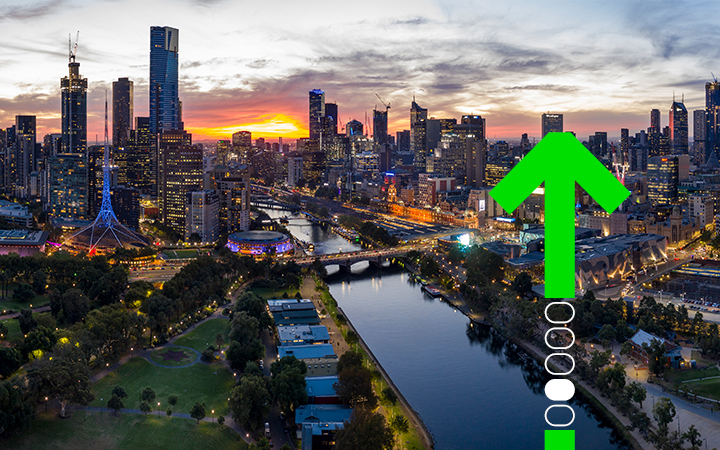PRESS RELEASE
Corporate travel takes off with lift in ‘Golden Triangle’ bookings

The ‘Golden Triangle’ of Sydney, Melbourne and Brisbane saw a boost in corporate travel bookings with Melbourne inching towards the most popular corporate destination.
According to exclusive data from Flight Centre Corporate’s FCM Travel and Corporate Traveller, the volume of flight bookings between the three major airports rose by 12 per cent in the first half of 2024, compared to the first half of 2023.
Melbourne took out a greater share of the arrivals, with 38 per cent of corporate travel between the three cities landing into the Victorian capital, compared it 39 per cent into Sydney in the first half of 2024. That’s up from 36 per cent into Melbourne and 40 per cent into Sydney in the first half of 2023. Brisbane maintained a 23 per cent share of the arrivals in the first half of both 2023 and 2024.
The top five industries travelling between Australia’s key business hubs in the first half of 2024 were Services, Finance and Insurance, Construction, Arts, Entertainment and Recreation, and Health and Social Services.
Flight Centre Corporate COO Melissa Elf said the increased travel between the ‘Golden Triangle’ was critical against the backdrop of continued economic pressures.
“More business travellers are taking to the skies between our major cities of Sydney, Melbourne and Brisbane, and we’re seeing Melbourne edge closer to the rate of travel into Sydney, taking out 38 per cent and 39 per cent of the arrivals respectively.
“It’s due in large to the returning capacity of airlines operating across and out of Australia since all State borders reopened in full.
“We’ve also seen new routes being added to the mix, particularly with carriers such as REX Airlines prioritising the connection of regional cities with our major state capitals.
“Sydney has of course long been the corporate travel darling, but it is shaping up to be a particularly strong year for travel into Melbourne, which was buoyed by ‘bleisure’ travel.”
Ms Elf said within a matter of months Melbourne saw the Australian Open, Taylor Swift, Melbourne Cup and the Formula One hit the city.
“During periods such as these, you might expect business travellers to be avoiding busy airports and hotels, but we actually saw a huge jump in corporate crowds, who were looking to get amongst the action while working in business meetings and events to their trips,” she said.
“Brisbane is also a growing market for business travel, making up 23 per cent of all bookings between the ‘Golden Triangle’. It’s really growing as a key business hub within Australia, becoming a destination of choice for company headquarters.
“Brisbane will go from strength to strength as it continues to benefit from both public and private investment ahead of the 2032 Games. As a broader region, Queensland is resource-rich and sees a lot of travel movement from mining, oil, gas and construction workers.
“It's evident across our corporate customer base that travel is non-discretionary, and falling airfares both domestically and internationally will keep demand for business travel strong against the backdrop of economic pressures.”
BITRE’s Air Passenger Movement Report shows a forecast average annual growth rate of passenger movements in Brisbane Airport by 4.5 per cent over the decade to 2026. It shows a 4 per cent average annual growth rate of passenger movements in both Sydney and Melbourne Airports.
Across all three airports, that’s a total of 38 million passengers passing through in 2026 – far more than Australia and New Zealand’s combined population.
The Global Business Travel Association predicted a growth in business travel of 27 per cent in 2023 in Australia. It has also revealed that in 2024 for every USD1 spent on business travel, a business would see a USD145 return in sales.